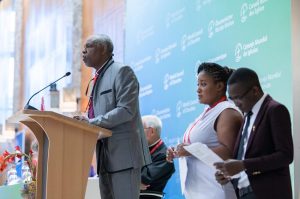At the meeting of the World Council of Churches chief governing body in Geneva from June 21-27, 2023, faith leaders formally endorsed the call for a Fossil Fuel Non-Proliferation Treaty, acknowledging that “while some measures are being taken to lessen the impacts of climate change, the primary cause of the climate crisis – fossil fuels – has barely been addressed.”

Representing 352 churches and 580 million Christians from more than 120 countries, the World Council of Churches’ endorsement of the proposed Fossil Fuel Treaty is seen as a major boost to the campaign that has already had support from a bloc of six nation states, the European Parliament and the World Health Organisation.
The World Council of Churches joins a global network of major faith institutions who have formally endorsed the proposed Treaty to manage a global just transition away from coal, oil and gas. In their letter to world leaders these faith communities are crystal clear: “The science surrounding the most urgent danger facing humanity is undeniable: to be good caretakers of our common home, we must act and phase out the production of fossil fuels.’“
Fossil fuels are the primary cause of the climate crisis, responsible for 86% of CO2 emissions in the past decade, according to the IPCC. The current scale of the climate crisis requires unprecedented levels of international cooperation, which is why significant momentum is building behind the proposal for a new framework to phase out the production of coal, oil and gas.
Bishop Dr Heinrich Bedford-Strohm, Moderator of World Council of Churches Central Committee, World Council of Churches, said: “I wholeheartedly support the initiative for a Fossil Fuel Non-Proliferation Treaty. The fact that the World Council of Churches Central Committee has endorsed it at its recent meeting may be a big backwind for a world which takes seriously that it is God’s creation given to us not for indiscriminate exploitation but for good care. Humans can only lead a good life together with nonhuman creation, not against it!”
In their formal endorsement, the World Council of Churches emphasised that countries most vulnerable to, and least historically responsible for, the consequences of climate change are the ones leading the push for a negotiating mandate for a new treaty to manage a fast and fair transition away from fossil fuels to “lead us out of this crisis”.
Rev. James Shri Bhagwan, General Secretary of the Pacific Conference of Churches, said: “Pacific Churches are grateful to the World Council of Churches Central Committee for their endorsement of the Fossil Fuel Non-Proliferation Treaty. The WCC has been supportive of such efforts and this positive response to a specific call by Churches from the region that are spearheading the political call for a Fossil Fuel Treaty is a strong affirmation for the just transition that we need along with just climate finance.
“It is also a reminder of the role faith communities play in mobilising the response to climate change. The ecological transformation that we call for means that we must sacrifice our current self-centred attitude. We must now find and keep within us the will to do what is right and just, the foresight to forgo immediate gains for the greater good, and the hope that we can pass on to our children a better world than we inherited.”
The Fossil Fuel Non-Proliferation Treaty proposal has also been formally endorsed by the World Health Organisation, the European Parliament, 3,000 scientists and academics, 700 parliamentarians from 84 countries, 101 Nobel laureates and over 2,000 civil society organisations.
The World Council of Churches joins a global network of hundreds of faith institutions and leaders who have supported the proposal, which is also backed by diverse groups including Vatican cardinals, Islamic Relief Worldwide, Soka Gakkai and the Anglican Communion.
